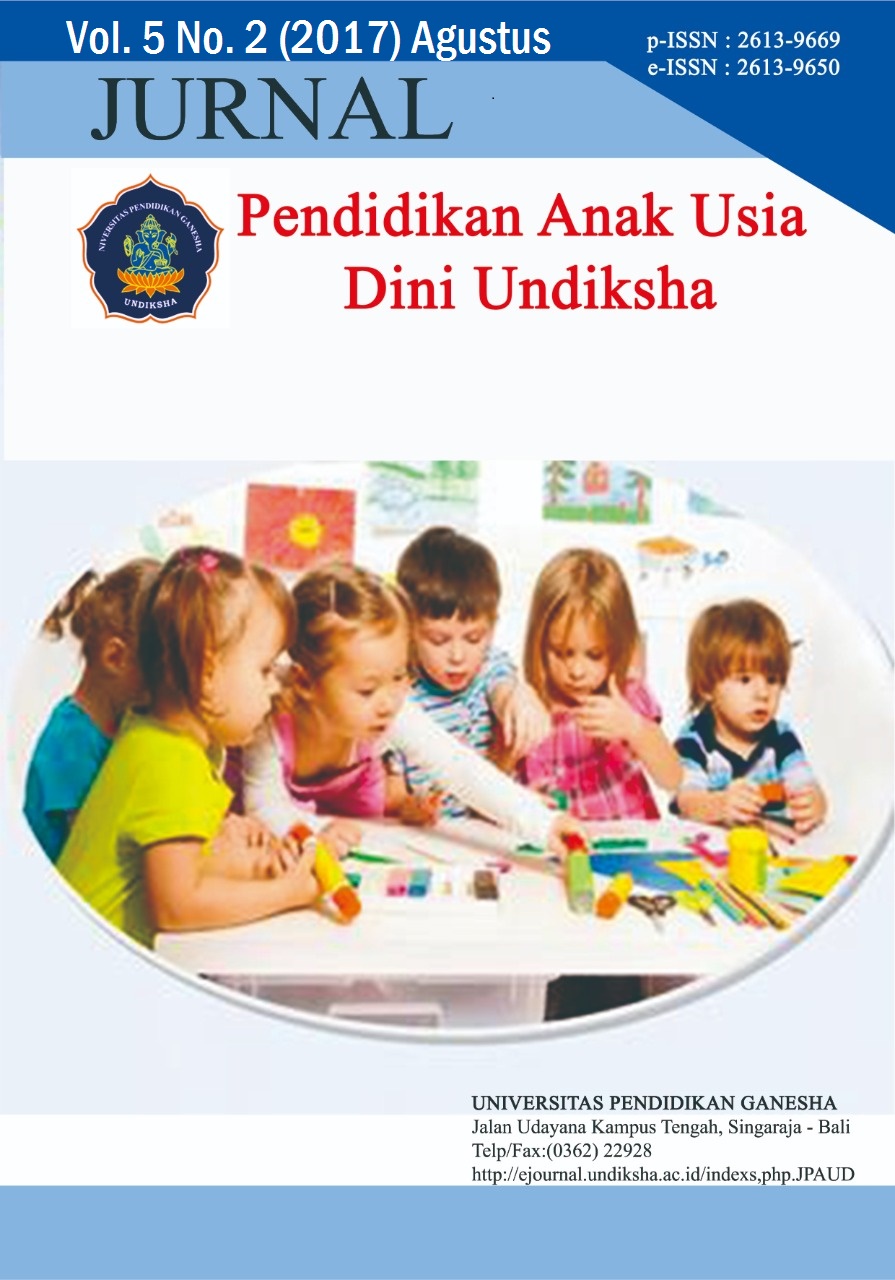PENGARUH METODE OUTBOUND TERHADAP DISIPLIN ANAK KELOMPOK B PADA GUGUS VI KECAMATAN BULELENG
DOI:
https://doi.org/10.23887/paud.v5i2.11676Abstract
Penelitian ini bertujuan untuk mengetahui pengaruh metode outbound terhadap disiplin anak pada anak kelompok B gugus VI kecamatan Buleleng Tahun Ajaran 2016/2017. Jenis penelitian ini adalah penelitian quasi eksperimen dengan rancangan mengguakan post-test only control group design. Populasi penelitian ini adalah seluruh anak kelompok B gugus VI kecamatan Buleleng yang berjumlah 322 orang.Teknik penentuan sampel pada penelitian ini menggunakan teknik cluster sampling. Sampel penelitian ini adalah anak-anak kelompok kelompok B di TK Trisula Singaraja yang berjumlah 21 orang sebagai kelompok eksperimen dan anak kelompok B1 di TK Ceria Asih yang berjumlah 15 anak sebagai kelompok kontrol. Metode pengumpulan data yang digunakan dalam penelitian ini adalah metode observasi. Dari uji normalitas homogenitas varians, bahwa sampel berdistribusi normal dan varian populasinya homogen maka untuk menguji hipotesisnya digunakan uji t dengan taraf signifikansi 5% dan derajat kebebasan (db) 32 adalah 2,036 dengan demikian thitung>ttabel. Berdasarkan kriteria pengujian, maka HA diterima yaitu terdapat perbedaan yang signifikan terhadap perilaku disiplin kelompok eksperimen dan kelompok kontrol, Adapun nilai rata-rata disiplin anak kelompok yang diberikan outbound adalah 23,67, sedangkan pada kelompok dengan pembelajaran konvensional (ceramah) adalah 12,60. Hal ini berarti metode outbound berpengaruh terhadap disiplin anak kelompok B di Gugus VI Kecamatan Buleleng Tahun Ajaran 2016/2017.Kata Kunci : disiplin, anak, metode Outbound
This research aims to determine the effect of outbound methods on the discipline of children in group B group VI Buleleng sub-district in the academic year 2016 / 2017. This type of research is quasi experimental research with a design using post-test only control group design. The population of this research is all children of group of group of group VI of Buleleng sub district which amounted to 322 people. The sample determination technique in this research uses cluster sampling technique. The sample of this research is the children of group B at Trisula Singaraja Kindergarten numbering 21 people as experimental group and B1 group children in Ceria Asih Kindergarten which amounted to 15 children as control group. Data collection methods used in this study is the method of observation. From the normality test of homogeneity of variance, that the samples are normally distributed and the variants are homogeneous then to test the hypothesis is used t test with significance level of 5% and degrees of freedom (db) 32 is 2.036 thus thitung> ttabel. Based on the test criteria, HA accepted that there is a significant difference to the discipline behavior of the experimental group and the control group. The average value of group discipline given outbound is 23.67, while in the group with conventional learning (lecture) is 12.60. This means that the outbound method has an effect on the discipline of group B's children in Buleleng District Buleleng District Court of 2016/2017.
keyword : discipline, children, methods Outbound
Downloads
Published
2017-07-31
How to Cite
., N. K. A. T., ., D. I. K. G., & ., M. M. S. (2017). PENGARUH METODE OUTBOUND TERHADAP DISIPLIN ANAK KELOMPOK B PADA GUGUS VI KECAMATAN BULELENG. Jurnal Pendidikan Anak Usia Dini Undiksha, 5(2), 167–177. https://doi.org/10.23887/paud.v5i2.11676
Issue
Section
Articles
License
Authors who publish with the Jurnal Pendidikan Anak Usia Dini Undiksha agree to the following terms:
- Authors retain copyright and grant the journal the right of first publication with the work simultaneously licensed under a Creative Commons Attribution License (CC BY-SA 4.0) that allows others to share the work with an acknowledgment of the work's authorship and initial publication in this journal.
- Authors are able to enter into separate, additional contractual arrangements for the non-exclusive distribution of the journal's published version of the work (e.g., post it to an institutional repository or publish it in a book), with an acknowledgment of its initial publication in this journal.
- Authors are permitted and encouraged to post their work online (e.g., in institutional repositories or on their website) prior to and during the submission process, as it can lead to productive exchanges, as well as earlier and greater citation of published work. (See The Effect of Open Access)











